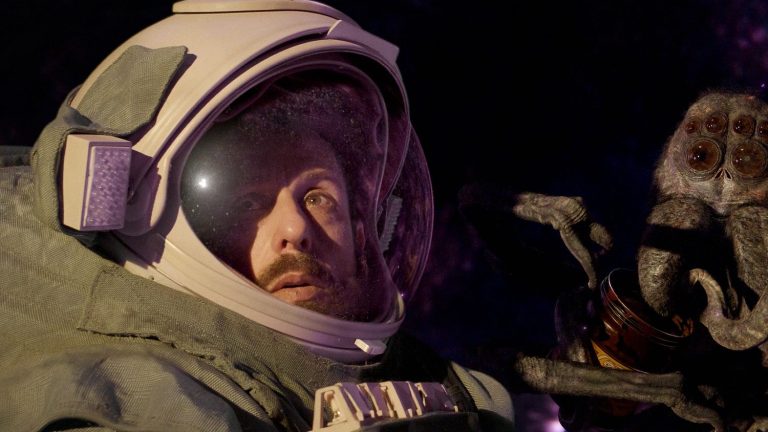Like Netflix’s Spaceman? Watch This Classic ’70s Sci-Fi Movie Next
Whatever you think of Spaceman, the Netflix Adam Sandler movie can introduce viewers to some great sci-fi movies.

People starting the movie Spaceman would be forgiven for thinking that their Netflix had glitched. Yes, we do see Adam Sandler’s character Jakub dressed in a space suit. But he’s not floating through the cosmos. He’s walking through a wooded stream, the greenery of the trees and bushes reflecting off his mask.
What the heck does this have to do with being a space man, one might ask? By the end of the movie, directed by Johan Renck and written by Colby Day (adapting the novel Spaceman of Bohemia by Jaroslav Kalfař), Spaceman answers all your questions. Or rather, Jakub’s new friend, an alien spider named Hanuš, explains everything in the gentle, dulcet tones of Paul Dano.
Spaceman‘s strange, but ultimately clear, approach may frustrate some viewers. It may excite others, leaving them wanting to watch more sci-fi movies with a surrealist approach. Regardless of one’s feelings about the movie, it’s clear that Spaceman draws from many works that came before it. In fact, this relatively accessible Adam Sandler/Netflix movie points the way to a much more difficult, but moving and rewarding piece of science fiction cinema, Solaris by Russian director Andrei Tarkovsky.
Solaris Is the Biggest Influence on Spaceman
“Is that it? Is that all there is of your film?” a functionary asks cosmonaut Henri Berton (Vladislav Dvorzhetsky) after viewing his findings from a recent space expedition. “But we don’t understand,” continues another administrator. “You filmed clouds. Why did you film clouds?”
Although Tarkovsky co-wrote the script for Solaris with Friedrich Gorenstein, adapting the novel of the same name by Polish sci-fi heavyweight Stanisław Lem, one senses the filmmaker, still early in his career, anticipating the complaints about his movie. As it turns out, the biggest complaints came from the creators themselves, with Lem frustrated that Tarkovsky did not go deep enough into his treatment of the characters’ psychology and the director himself annoyed that he did not transcend the sci-fi genre. However, the movie was a box office sensation in Russia and largely recognized as a triumph abroad.
Viewers today, however, might be baffled by the film. Solaris stars Donatas Banionis as Kris Kelvin (but voiced by Vladimir Zamansky), a psychologist sent by the Soviet space program to investigate strange occurrences on a space station orbiting an ocean plot called Solaris. Kelvin arrives to find not only the surviving cosmonauts in mental disarray but he also starts experiencing visions of his late wife Hari (Natalya Bondarchuk).
Solaris digs into the nature of knowledge and reality, particularly in view of failed relationships. The spectral Hari who visits Kelvin is a clear forerunner to Jakub’s wife Lenka (Carey Mulligan) and Hanuš, as she draws out Kelvin’s damaged emotions and forces him to confront them. However, unlike Hanuš, neither Hari nor any of the other visions in Solaris explain themselves or anything else.
The drama plays out through Banionis’ expressions, the rich cinematography by Tarkovsky and his DP Vadim Yusov, and the moody score by Eduard Artemyev. The meaning of the film doesn’t come easily, instead challenging the viewer to approach the film on a philosophical level, with no clear resolution.
To be sure, Tarkovsky isn’t everyone’s cup of tea. Those going for a fun, or even easily-digestible experience like Spaceman, will find themselves echoing the questions posed to Burton: “Why did you film clouds?” But those who want more substance, but aren’t quite ready for 1970s Soviet slow-burn sci-fi, there are some alternatives.
Solaris Remake, Ad Astra, and Interstellar
In 2002, American director Steven Soderbergh remade Solaris with George Clooney in the lead as Kelvin and Natascha McElhone as his wife Rheya. Soderbergh made Solaris in between Ocean’s Eleven and Ocean’s Twelve, and promised to hew more to the Lem novel than to Tarkovsky’s movie, but it is without a doubt challenging. However, Soderbergh’s Solaris is in English and features recognizable stars, including Viola Davis, Jon Cho, and Jeremy Davies. That should make it a bit more accessible to those earlier on their cinematic journey.
Director James Gray’s Ad Astra (2019) certainly has aspects of Solaris, presented in a glossy Hollywood package. Co-written by Gray and Ethan Gross, Ad Astra stars Brad Pitt as an astronaut seeking to continue his lost father’s work on a space station orbiting Neptune. The long, arduous journey to Neptune is definitely worth the price of admission, with Pitt’s astronaut facing more than his fair share of obstacles along the way. It’s also a bit more action-y than these other, more meditative sci-fi flicks.
Christopher Nolan’s Interstellar (2014), co-written with brother Jonathan, also involves a lonely space traveler (Matthew McConaughey) whose mission forces him to leave his family behind but also challenges him to face his shortcomings as a father once he’s out in the darkness of space. It’s also trippy as hell in a way fans of Spaceman will definitely recognize, all leading to the big, twisty crescendo Nolan films are known for.
In short, Spaceman launched from a rich history of introspective sci-fi movies. It may not reach the heights of the best the genre has to offer, but it’s a great first step for those looking for more challenging sci-fi.
